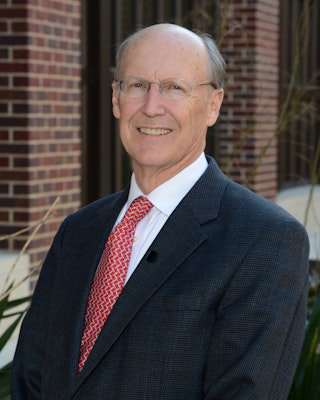Editor's Note
Are we ready? Leaders address today’s disruptive challenges.

As Americans, we repeatedly have faced change over our 241-year history. But the pace of transformation is arguably far faster today than in previous eras. And it often comes with immediate consequences. Think how the smartphone has changed the way we live in barely a decade.
The Spring Catalyst asks whether we are ready for the numerous forces that are driving change in our country and beyond. This edition follows up on the George W. Bush Presidential Center’s April Forum on Leadership, which convened national and international leaders and innovators from the public and private sectors to look at the economic, political, and technological disrupters of our way of life.
Mind you, these changes may be quite beneficial, as some contributors emphasize. Yet they each make us rethink how we see the world. They also require the development of leaders who can help us understand and benefit from disruptive forces, as well as respond to them.
Among our contributors, who each participated in the April event, you will find:
- President George W. Bush and U2 lead singer Bono challenging the common assumption that political differences must stop people from working together on a shared mission.
- Jeff Bezos, Amazon’s Founder and CEO, explaining his passion for space travel and why he wants to lower the cost of access to space.
- Scott Phoenix, Co-founder of Vicarious, an artificial intelligence (AI) developer, describing why he believes the next generation of AI will reshape how the world works, just like the printing press, the wheel, and the telephone improved society.
- Dr. Eric Olson of the University of Texas Southwestern Medical Center presenting the potential of gene-editing technology – and why we need a broad dialogue about the perils of the evolving ability to modify the code of life.
On the theme of leaders navigating us through a world in upheaval, you will hear from:
- Democratic Gov. John Hickenlooper of Colorado and Republican Gov. Susanna Martinez of New Mexico about governing in divided times.
- Ken Hersh, President and CEO of the George W. Bush Presidential Center, on the need for effective leaders as slow-moving institutions struggle to stay abreast of fast-moving technological and economic change.
- Natalie Gonnella-Platts, Deputy Director of the Bush Institute’s Women’s Initiative, recalling how grandmothers have shown her and many others the art of leadership.
- Colonel Miguel Howe, the April and Jay Graham Fellow at the Bush Institute’s Military Service Initiative, emphasizing the disruptive power of veteran leaders.
- ”Next generation game changers” Diana Mao, James “Kassaga” Arinaitwe, and Daniela Terminel on how they are disrupting their fields with the power of an idea.
- Catalyst Digital Editor Andrew Kaufmann reminding us that you don’t need to be a big name to be a leader.
And in our look at disruptive forces globally and domestically:
- American Enterprise Institute President Arthur Brooks animatedly describes why conservatism should lead with a heart here and abroad.
- Edward Lazear, a Stanford University professor and Hoover Institution senior fellow who once chaired the Council of Economic Advisers under President Bush, discusses growing world powers, America’s education shortfalls, an outdated immigration system, and the federal debt.
- Bush Institute Education Reform Director Anne Wicks acknowledges that we don’t know the jobs of tomorrow but lifelong learning is the way to make sure we are ready for them.
- Lindsay Lloyd, Deputy Director of the Bush Institute’s Human Freedom Initiative, addresses the destructive force of isolationism and reminds us why great powers can’t get tired – and why we need to keep winning that argument.
- Robert Doar of the American Enterprise Institute draws from his experience administering social services to argue that a Universal Basic Income would undermine the social safety net.
- Bush Institute Economic Growth Director Matthew Rooney comments on the need for American leadership to embrace the realities of global markets.
- SMU Economics Professor Klaus Desmet explains why the cities of tomorrow will need smart conservation strategies to sustain themselves.
We heard from many of you after our winter edition on immigration reform, so please continue to email us your comments. And look for our summer edition and its focus on Your Town and the power of localism, another force that is shaping America – often for the better.
Letters to the Editor: What You Thought About the Winter 2018 Immigration Catalyst
Re: Winter 2018 Immigration Catalyst
Juan Carlos Cerda does not understand what in immigration literature is known as “one of the strangest political bedfellows”: right-wing and left-wing nativists. He is naively or dogmatically sugarcoating the extreme left’s responsibility on the failure to pass immigration reform. Left wingers have opposed immigration reform and have consistently painted immigrants as the culprit for loss of jobs.
Crispina Espinosa, Fairburn, Georgia
Re: Winter 2018 Immigration Catalyst
Latinos are always welcome in my view; my suggestion that the Constitution as intended is taught and emphasized in its originality by all coming to America.
Andrew Nauta, Waterbury, Connecticut
Re: Winter 2018 Immigration Catalyst
If you crossed illegally, you don’t have a voice here. Legal immigration must also be reduced. We have a lot of poor and disabled citizens and veterans that we need to take care of first. There is much to do.
Cecilia Sotomayor, Deer Park, Texas
Re: Winter 2018 Immigration Catalyst
I am not against DACA but want a stringent bill. No general amnesty. Each applicant should be judged the same as any other applicant. No amnesty for parents, no chain or lottery immigration.
Maureen McWilliam, Coral Gables, Florida
Re: Winter 2018 Immigration Catalyst
I read with interest Andrew Kaufmann’s article on baseball and diversity. As a die-hard baseball fan (go Cubs!) for 67 years, the Latino influence in particular has grown significantly. These players bring a whole new dimension to what it is to be an athlete. Clearly, baseball is a shining example of diversity where respect for various cultures is paramount.
Scott Risch, Omaha, Nebraska
Re: Winter 2018 Immigration Catalyst
Thank you for [Ioanna Papas’ piece] on the refugee issue. Many Americans, if not most, have some anxiety and even fear of those who are different from us. It is in our DNA and has been for centuries. If we could have personal contact with refugees, we’d quickly learn that they have the same hopes and dreams as we do.
John Solomon, Dallas, Texas
Re: Winter 2018 Immigration Catalyst
I thoroughly enjoyed Amanda Schnetzer’s essay on “Recovering our Common Purpose.” I expressed many of those same sentiments with my South Carolina congressional representatives. If America, and all that it stands for, wants to be first among nations it must remember it must be a servant of all. A servant to serving the cause of freedom: the freedom of speech and expression; the freedom to worship God in his own way; and freedom from want and freedom from fear.
Christopher Himsl, Columbia, South Carolina
Colonel, U.S. Army (Ret.)
The Catalyst believes that ideas matter. We aim to stimulate debate on the most important issues of the day, featuring a range of arguments that are constructive, high-minded, and share our core values of freedom, opportunity, accountability, and compassion. To that end, we seek out ideas that may challenge us, and the authors’ views presented here are their own; The Catalyst does not endorse any particular policy, politician, or party.

